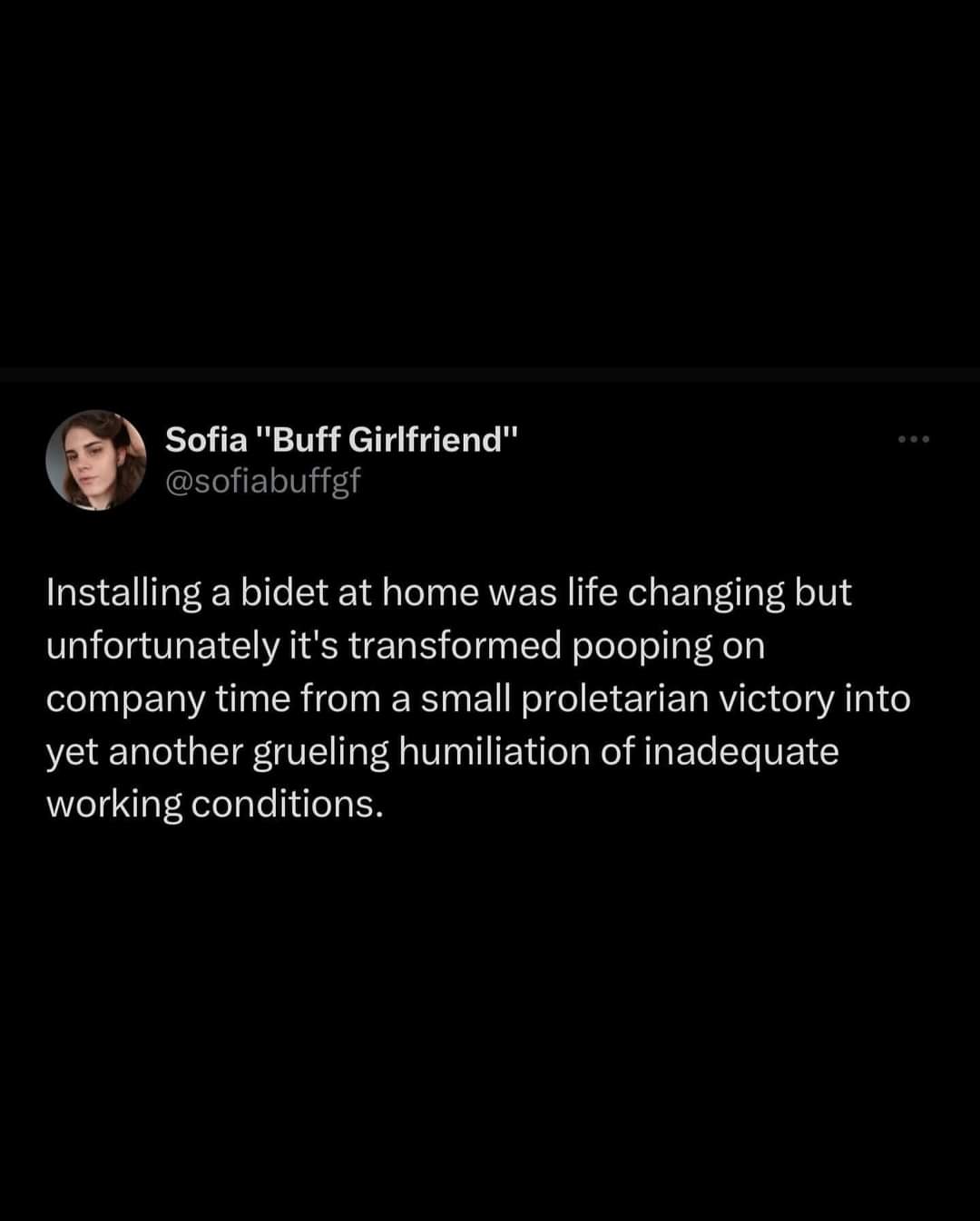this post was submitted on 14 May 2024
1438 points (98.8% liked)
Microblog Memes
7888 readers
3198 users here now
A place to share screenshots of Microblog posts, whether from Mastodon, tumblr, ~~Twitter~~ X, KBin, Threads or elsewhere.
Created as an evolution of White People Twitter and other tweet-capture subreddits.
Rules:
- Please put at least one word relevant to the post in the post title.
- Be nice.
- No advertising, brand promotion or guerilla marketing.
- Posters are encouraged to link to the toot or tweet etc in the description of posts.
Related communities:
founded 2 years ago
MODERATORS
you are viewing a single comment's thread
view the rest of the comments
view the rest of the comments

I don't know if I'd trust a public bidet, the amount of poop people leave on the toilet seat doesn't give me confidence they wouldnt find a way to get their explosive slosh into the nozzle
I think we just need tiny sinks in stalls, or rather, all public stalls should be designed as semi-ambulant stalls.
Growing up as a crutches user (hip deformity) I didn't fully comprehend that the standard stalls don't have sinks in them. I kind of knew they didn't all have sinks, but I didn't think too hard about it, I sort of assumed the reason most people flushed then came to the main public sink was to use the mirror or dryer.
I got to used to filling my personal bidet at the sink, using it, and washing it at the sink, all behind the privacy of a closed bathroom door.
When I had my hip surgery and no longer needed semi ambulant stalls, or disability access stalls, and it was just so inconvenient to fill and rinse a bidet bottle in a regular public bathroom I stopped using it.
Then a few months later started using the semi ambulant stalls again so I can use my bidet, because it turns out my lichen sclerosis doesn't like public toilet paper and I was getting really bad infections.
But yeah, personal bidet bottles are great, but they require a tap near the toilet.
Some public sinks are easy to fill a bidet bottle, but a lot aren't, you physically can't fit a bottle under the taps and because bidet bottles aren't common it can feel embarrassing to fill it at the public sinks. Disability stalls almost always have a proper tap and sink for washing toilet aid devices.
Back when I needed a bidet I kept my portable full and would refill it when I washed my hands. It took up half to all of my purse, depending on how large of a purse I was carrying, but it was worth it. I'd just use a peri bottle (kept two in my bag) I'd get from the hospital. Not sure where to get them when you're not inpatient.
In Australia, most larger chemist's sell peri bottles in the antenatal section, near the breast pumps and maternity pads.
They also sometimes sell cheaper, less pink, peri bottles in the OT/home aid section, or in the ailse with the laxatives and enemas.
You can definitely get them on Amazon. I also find them occasionally in the toiletries section of Muslim grocery stores, and occasionally Asian stores, near the buckets, stools, and tabo cups.
Do you have any recommendations for a portable bidet bottle? Honestly it seems like I could just make one out of a plastic bottle but I'm curious if you've got any fancy recommendations
I don't have any fancy suggestions, because much like you, I often went DIY. Because of my skin condition I've always needed a bidet, so convenience and utility was my draw, the fact I had to carry it with me everywhere my whole life since adolescence.
Pretty sure when I was first taught to do it by my chronic care nurse I was just using hospital peri-bottles. For a while I just carried a 50ml syringe in my bag and a bottle to draw water from.
But at some point (probably around 12 when I joined Scouts) I found these "bidet bottlecaps" at hiking stores, and I remember a time when I just had these bottle caps everywhere and would have plastic bottles with hair ties on them in random purses (I'd put a hair tie around the bottle to remind me it was not drinking water anymore) the brand name I'm seeing pop up is CuloClean, but I mostly see cheap screw on no-brand ones near the register at camping stores.
Now days I mostly DIY them with a lighter, a q tip and a pin.
Just take any plastic bottle lid, heat it up with the lighter to soften the plastic, use the q-tip to push the soft plastic to make a "nipple", you're basically trying to make the bottle lid resemble a baby bottle. Then take the pin and make a ~1-2mm hole in the side of the nipple. It's a good idea to sit down and hold the bottle and see how you're planning to aim the stream so you can plan where you want to angle the hole you're making in the lid.
I'm glad I found this method, because I like the little 250ml bottles of Quench Juice, they squeeze easy, hold just the right amount of water, and fit really neatly in all my purses (and the juice is nice too, lol). But the lid was never compatible with the bidet bottle caps, so now I DIY the existing cap of whatever bottle I prefer.
But in either case, you need to have a second, unaltered bottle cap to swap out after use, so the bottle is water tight for storage again. (though, you can always leave it empty and just refill immediately before use, then empty it completely afterwards)
As a Spanish speaker I love that name haha